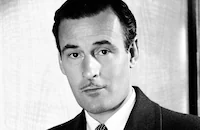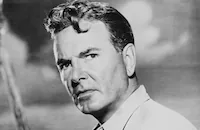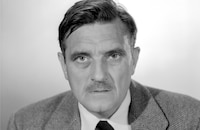Death of a Scoundrel

Brief Synopsis
Cast & Crew
Charles Martin
George Sanders
Yvonne De Carlo
Zsa Zsa Gabor
Victor Jory
Nancy Gates
Film Details
Technical Specs

Synopsis
After Bridget Kelly, assistant to corrupt New York financier Clementi Sabourin, finds her boss dead in the bedroom of his New York mansion, she tells the police that Clementi was an evil genius, and recounts his history: Freed from a Nazi prison camp in Czechoslovakia, Clementi travels to Italy to see his brother, Gerry Monte, and learns that Gerry has opened an antique shop with Clementi's money and married his girl friend Zina. Clementi vengefully turns Gerry in as an illegal immigrant in exchange for a U.S. visa, and his brother is killed during his subsequent arrest. Just before he disembarks in New York, Clementi meets oilman Leonard Wilson, to whom he describes his theory on how to obtain wealth dishonestly. Wilson later drops his wallet while exchanging money, and Clementi follows Bridget Kelly to a bar after she picks it up. Although Wilson suspects Clementi, police do not find the wallet on him. However, Clementi later steals the wallet from Bridget when he goes home with her, and is chased into the street by her friend Jack. Jack shoots Clementi in the shoulder, and is then killed by a truck. When a doctor treats his wound with a revolutionary new medicine called penicillin, Clementi falsely endorses Wilson's $20,000 check to buy stock in the pharmaceutical company that makes the antibiotic. Clementi's investment precedes public announcement about the medical breakthrough, and he immediately earns over one hundred thousand dollars. Soon after, Clementi meets wealthy widow Ryan at the brokerage firm, and encourages her to follow his investment advice. After Mrs. Ryan also turns a profit, Clementi convinces her to pay him $20,000 for his shares, and then exchanges her check for Wilson's check. Clementi's broker, O'Hara, learns that Clementi's original check was bad and blackmails him into paying $5,000 and starting an investment business in which he is the junior partner. Clementi then buys a mansion and hires Bridget as his assistant. When Wilson's Canadian oil company starts to fail, Clementi and Bridget travel to Canada, where Clementi returns the check and offers to buy the company, after revealing that he has published Wilson's confidential financial statement and caused his stock to plummet. Clementi returns to New York while Bridget convinces Wilson to sell. Bridget later arranges to bring a newspaperman to the oil fields, just as an engineer reports that they have struck oil. Clementi sells the Wilson stock after having made a handsome profit, but the company actually strikes oil and the stock skyrockets. Mrs. Ryan is thrilled that Clementi's advice has worked to her advantage and throws him a lavish party. Clementi invites Mrs. Ryan's attractive secretary, Stephanie North, to the party, but spends most of his time flirting with Edith, the wife of wealthy department store owner Oswald Van Renassalear. Mrs. Ryan humiliates Stephanie when she discovers her at the party, and while comforting Stephanie, Clementi learns of her ambition to be an actress. The next day, he arranges to back a Broadway play on the condition that Stephanie gets the lead role, but she is unaware that he did more than just put in a good word for her. In the meantime, Clementi uses a two million dollar investment from Mrs. Ryan to create a false company called "Sabouranium," with which he plans to accept investments and then go into receivership. To everyone's surprise, Stephanie's performance is a huge success, and on the night of the opening, Clementi tries to seduce her. Stephanie mocks him and leaves, however, so he has her fired the next day. Clementi is later moved by her genuine distress and confides to Bridget that he wanted Stephanie because she is "good." After Bridget admits that she has fallen in love with him, Clementi advises her that his only interest is money, then tells the producer to reinstate Stephanie in the show. Clementi pursues a romance with Edith, and arranges for her to catch her husband and Bridget at a restaurant together. Edith later files for divorce, and Clementi makes plans to take over Oswald's company, in which she holds the controlling shares. Before he flies to Chicago to see her, however, he is confronted by Zina, who has come to avenge Gerry's death. Clementi plays on Zina's emotions and convinces her not to kill him but to join him in Chicago. Zina poisons herself after she sees Clementi with Edith, but leaves a statement accusing Clementi of her murder. Clementi is arrested for manslaughter and released on bail, but panics when his lawyer, Herbert, tells him that the district attorney intends to deport him to Czechoslovakia. Newspapers soon report that Clementi is also suspected of embezzlement, and a desperate Clementi sends for his elderly mother in Europe. Clementi's mother is thrilled that her son has finally sent for her, but her joy turns to horror when Clementi asks her to claim that he is the illegitimate son of a Swiss man, so that he will be deported to Switzerland, where he can keep his money in a private account. Clementi is rejected by his mother, and newspapers decry him as a "barbarian" who represents the moral corruption of society. Bridget leaves Clementi, and suggests that he return the money he stole from investors. At his office, Clementi signs over the stock certificates to the original buyers. O'Hara finds him in the office, and, desperate to save himself, shoots Clementi. The wounded Clementi then fatally shoots O'Hara during a struggle over the gun. Clementi stumbles home, and when his mother refuses to forgive him, he calls Bridget, begs for her forgiveness, and dies. Bridget now turns the stock certificates over to the police, and sadly leaves the mansion.

Director
Charles Martin
Cast

George Sanders

Yvonne De Carlo

Zsa Zsa Gabor

Victor Jory

Nancy Gates

Coleen Gray

John Hoyt

Lisa Ferraday

Tom Conway
Celia Lovsky

Werner Klemperer
Justice Watson

John Sutton
Curtis Cooksey
Gabriel Curtiz

Morris Ankrum
Crew
Charles Arrico
Irwin Berger
Olga Collings
Gabriel Curtiz
Murray Cutter
Ross Dowd
Rudi Feld
Frank Fox
George Gittens
James Wong Howe
John Hoyt
John Kean
J. Herbert Klein
Charles Martin
Charles Martin
Pat Miller
George Moskov
Conrad Nervig
Rosamonde Price
Karlie Taylor
Waldo
Jack Wilens
Paul Wolfe

Videos
Movie Clip



Hosted Intro
Film Details
Technical Specs

Articles
Death of a Scoundrel
While Death of a Scoundrel is no masterpiece compared to Citizen Kane, it's still enormously entertaining trash. The narrative pace is pitched at a full gallop, with Sabourin's driving ambition painted in broad strokes. The cast of characters who cross Sabourin's path, and are subsequently used and abused, are colorful caricatures and the dialogue has the crude vitality of a pulp fiction novel. But the real enjoyment here comes from George Sanders's energetic performance as the nefarious Sabourin. The actor often referred to Death of a Scoundrel as his favorite role and you can see why it appealed to him. In direct contrast to the worldly cynics he played in films like The Moon and Sixpence (1943) and All About Eve (1950), Sanders gets to display a vast range of emotions as Sabourin, going from stunned surprise to gleeful hatred to hand-wringing desperation. Don't look for subtlety; this is scene-chewing at its most outrageous. Some admirers of Sanders' work might even consider it his WORST performance but, in certain ways, it might be the role closest to the actor's own personality. To those who knew him well, Sanders really was a misanthrope and an elitist who could be alternately charming and cruel. Even in his own autobiography, Memoirs of a Professional Cad, Sanders admitted as much, candidly airing his views on romance and other matters: "It is impossible to be in love with a woman without experiencing on occasions an irresistible desire to strangle her." Indeed, there are lines in Death of a Scoundrel that could have been improvised by Sanders such as "Finance is the basis of most relationships, don't you agree?" or "Isn't that what love is - two people chained together?" In many ways, Sanders' cynical attitude toward romance shares a philosophical link with the cinema of German director Rainer Werner Fassbinder where love is often viewed as a master-slave relationship between two individuals.
Death of a Scoundrel was something of a family affair for Sanders. Not only did it allow him to appear opposite his own brother, actor Tom Conway in the role of the betrayed sibling, but it also provided a juicy role for his ex-wife, Zsa Zsa Gabor, as a wealthy widow he exploits for personal gain. The other key supporting roles include Victor Jory as a victim of Sabourin's schemes, Nancy Gates as a secretary turned aspiring actress, John Hoyt as an accomplice-in-crime, and Yvonne De Carlo as the cunning streetwalker who is used as a seductive decoy for potential business partners. In spite of its low budget, Death of a Scoundrel is a superior B-movie, sporting a lush music score by Max Steiner (Gone With the Wind, 1939) and cinematography by James Wong Howe (Hud, 1963).
One interesting side note: According to Charles A. Butler in Films in Review, "RKO's legal department is reported to have instructed RKO's promotional department not to cause the public to infer that the stinker in Death of a Scoundrel bears more than coincidental resemblance to Serge Rubinstein, the financial operator and draft-dodger who kept himself from being deported from this country, to which he came as a refugee, but could not keep himself from being murdered. Incidentally, his murderer has not been apprehended."
Producer/Director: Charles Martin
Screenplay: Charles Martin
Art Direction: Rudi Feld
Cinematography: James Wong Howe
Editing: Conrad A. Nervig
Music: Max Steiner
Cast: George Sanders (Clementi Sabourin), Yvonne De Carlo (Bridget Kelly), Zsa Zsa Gabor (Mrs. Ryan), Victor Jory (Leonard Wilson).
BW-120m.
by Jeff Stafford

Death of a Scoundrel
Quotes
Trivia
Notes
Charles Martin's onscreen credit reads: "Produced, Written and Directed by Charles Martin." According to a modern source, this film was re-titled The Loves and Death of a Scoundrel for marketing purposes. Although a January 1956 Hollywood Reporter production charts and news items add George Brent, Ted Jacques, Renee Patryn and Michael Mark to the cast, Brent does not appear in the released film, and the appearance of the other actors has not been confirmed.
Reviews noted the resemblance between "Clementi Sabourin" and real-life New York financier Serge Rubinstein, an amoral, Russian-born immigrant who had a genius for manipulating money. Rubinstein, a renowned playboy and swindler, was convicted of evading the draft in 1947. He was murdered in January 1955, and although an intensive investigation followed, the killer was never identified.
















